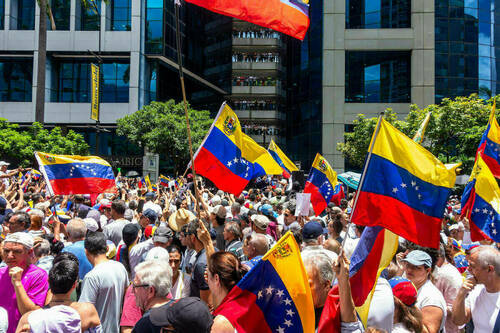Venezuela’s transformation from one of Latin America’s most stable democracies to a full-blown authoritarian regime offers crucial lessons for opposition movements worldwide, according to new research.
In a country where elections are now manipulated, political opponents imprisoned, and basic rights suspended, the opposition’s recent electoral challenge to President Nicolás Maduro demonstrated that resistance remains possible even under severe repression.
“No one expected Venezuela to have elections,” said the political scientist, whose analysis appears in a special issue of the Annals of the American Academy of Political and Social Science. “The opposition competed even though their ability to compete was diminished, and they won even though the odds of winning were very small. Yes, the regime clamped down, but it’s significant that the opposition was able to express itself in an electoral space.”
The research traces Venezuela’s 25-year descent into authoritarianism through three distinct phases, beginning with Hugo Chávez’s election in 1998 and his subsequent moves to rewrite the constitution. What makes the Venezuelan case particularly instructive is how the opposition’s strategic choices—sometimes ill-conceived—accelerated or slowed democratic backsliding at critical junctures.
Perhaps the most consequential mistake came early. Despite retaining significant institutional power after Chávez’s initial power grab in 1999, the opposition chose radical approaches instead of working within the system.
“Using tactics like coups, boycotts or strikes can be effective ways to protest a government, but they can backfire when you leverage them against a popular and democratically elected president,” the researcher explained.
The 2002 coup attempt and 2003 oil strike proved particularly costly. Rather than forcing Chávez from power, these moves gave him justification to purge military leadership, fire oil company managers who opposed him, and consolidate control over key institutions.
“The Venezuelan case provides several lessons for countries whose democracies are just beginning to erode,” the researcher emphasized. “It shows that you should use all of the institutional spaces you have while you have them. Not leveraging those spaces is a mistake.”
By 2006, Venezuela had transitioned into what political scientists call a “competitive authoritarian” regime, where elections continue but under increasingly unfair conditions. Yet even as democratic space shrank, the opposition eventually adopted more institutional strategies, forming a coalition that won impressive victories in 2015 legislative elections.
Maduro’s response—stripping the legislature of power—highlighted another cycle in autocratization: when institutional resistance succeeds, autocrats simply change the rules, forcing opposition groups to adapt again.
The culmination of this long struggle played out dramatically in July 2024, when opposition candidate Edmundo González appears to have defeated Maduro despite severe restrictions. Though Maduro refused to concede and declared himself the winner, opposition leader María Corina Machado announced that tallies from more than 70 percent of voting stations showed González had received 3.5 million more votes.
“We see from these successes that when you use institutions, there can be a good payoff,” the researcher noted.
The analysis also reveals how Venezuelan opposition movements frequently shifted between electoral strategies and street demonstrations in patterns that undermined effectiveness. Rather than coordinating protests to support electoral campaigns, protests typically surged after electoral defeats or boycotts.
This changed in 2024, when Maduro’s apparent electoral fraud sparked widespread demonstrations. For the first time, Venezuela’s opposition seemed to connect electoral participation with street mobilization—though they’ve struggled to protect supporters in poorer neighborhoods facing the harshest government repression.
“If the opposition chose to leverage both institutional and non-institutional strategies and use them together, that would probably be more powerful,” the researcher said.
The insights from Venezuela arrive as democracies worldwide face unprecedented pressure. For opposition movements in places where democratic institutions are being undermined, the research offers both warnings and reasons for hope.
“In the past two decades, we have seen a significant decline in democracy across the world,” the researcher said. “Democracies have eroded into authoritarian regimes, and formerly weak autocracies have become more entrenched. For opposition movements in both of these cases, Venezuela offers lessons and hope.”
If you found this reporting useful, please consider supporting our work with a small donation. Your contribution lets us continue to bring you accurate, thought-provoking science and medical news that you can trust. Independent reporting takes time, effort, and resources, and your support makes it possible for us to keep exploring the stories that matter to you. Thank you so much!




